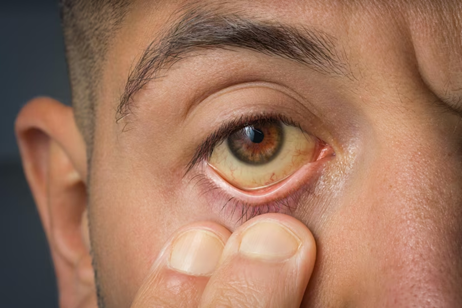It is characterized by yellowing of the skin and eyes, a sign that requires attention. This condition occurs when there is too much bilirubin in the blood, and a yellow pigment is produced during the breakdown of red blood cells. Here is a simple guide to understanding what jaundice is, its causes, and when to seek medical advice.
What is Jaundice?
A medical term used to describe the yellowish tint that appears in the skin and the whites of the eyes. This discoloration occurs when bilirubin, which is usually processed by the liver, builds up in the bloodstream. When the liver is overloaded or damaged, it cannot effectively remove bilirubin, leading to its accumulation.
Why Does Jaundice Occur?
Several conditions can cause jaundice, including:
- Hepatitis: Inflammation of the liver that impairs its ability to process bilirubin.
- Gallstones: These block the bile ducts, preventing the elimination of bilirubin.
- Blood Disorders: These conditions can increase the breakdown of red blood cells, leading to excess bilirubin.
- Liver Cirrhosis: Scarring of the liver that hampers its function, allowing bilirubin to accumulate.
Spotting the Signs
Jaundice often first appears in the eyes, but other symptoms may include:
- Dark-colored urine
- Pale stools
- Itchiness
- Fatigue or abdominal pain, which could indicate liver issues
Diagnosis and Treatment
To diagnose jaundice, a doctor will typically:
- Perform a physical examination
- Review your medical history
- Order blood tests to assess liver function
- Recommend imaging tests like an ultrasound if necessary
Treatment focuses on addressing the underlying cause of jaundice. For liver conditions, medications or lifestyle changes may be suggested to improve liver health. Blockages, such as gallstones, might require surgical removal. Newborns with jaundice often receive phototherapy, which uses light to break down excess bilirubin.
In all cases, supporting your liver with increased fluid intake, a balanced diet, and avoiding alcohol can aid recovery.
Jaundice in Newborns
Jaundice is common in newborns due to their immature livers and usually resolves without treatment. However, severe jaundice in infants requires prompt medical attention.
Prevention and Care
While not all causes of jaundice can be prevented, maintaining a healthy liver is key. This involves:
- Limiting alcohol consumption
- Eating a balanced diet
- Getting vaccinated against hepatitis
- Managing cholesterol and maintaining a healthy weight
Jaundice serves as a yellow warning light indicating that your body needs attention. It is a symptom, not a disease, but it should not be ignored. Understanding jaundice is essential for maintaining liver health and overall well-being. If you notice any yellowing in your body, seek medical advice from an expert to ensure your health is on the right track.



